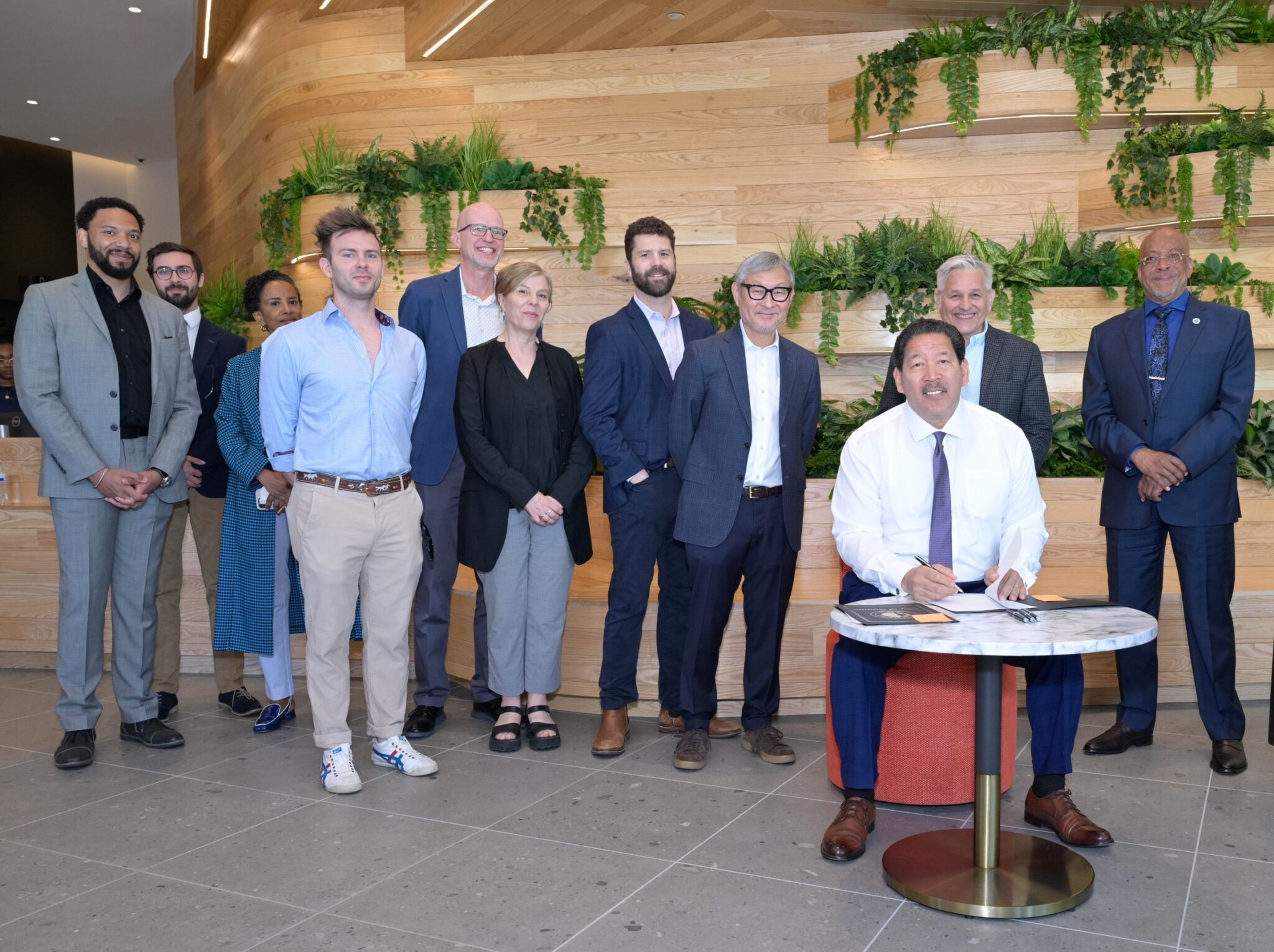
Seattle – Today, Mayor Bruce Harrell joined Councilmember Mark Solomon to sign two pieces of legislation that advance Downtown Activation Plan (DAP) goals of revitalizing downtown’s economy and creating more housing.
“Housing, jobs, and a diversity of small businesses are critical to the economic vitality and vibrancy of downtown Seattle,” said Mayor Harrell. “Advancing the goals of our Downtown Activation Plan, this suite of legislation will remove regulatory barriers and create more opportunities for entrepreneurs and small businesses to call downtown home while also keeping thousands of units of critical housing awaiting construction afloat. I want to thank Councilmember Mark Solomon for his urgency and strong work on the Land Use committee to get these priorities over the finish line.”
The first piece of legislation will help fill vacant storefronts in Downtown, Uptown, and South Lake Union neighborhoods by expanding street-level uses for commercial spaces. This will broaden the pool of eligible commercial tenants, creating engaging, pedestrian-oriented street environments throughout the urban core.
New options for permitted businesses would include medical offices, research and development laboratories, food processing, horticultural operations, crafts manufacturing, art installations, and any similar use or activity determined by the Seattle Department of Construction and Inspections (SDCI) to attract and increase pedestrian activity or increase the variety of goods and services available.
The second piece of legislation will extend amend the 2021 Seattle Building Code to extend permits for projects vested under the 2015 and 2018 code for another two years, allowing projects that are delayed due to challenging economic conditions to proceed without having to apply for a new permit.
This legislation ensures the feasibility of projects, provides certainty to developers, and will prevent the potential loss of 29,000 planned units of housing, including many affordable housing units and housing projects planned for downtown Seattle.
“By cutting through red tape and adding flexibility to our current code, we can activate vacant storefronts with new tenants and help ensure the feasibility of future housing projects,” said Councilmember Solomon, District 2 and Land Use Committee Chair. “These changes will help bring more residents, workers, and visitors to our city’s center, boosting our local economy, enhancing public safety, and creating vibrant streetscapes.”
Other DAP efforts focused on increasing development and economic activity include establishing a design review holiday for new projects in downtown neighborhoods; supporting conversions of existing commercial buildings to residential uses; advancing rezones along the Third Avenue corridor to allow for more housing development; increasing flexibility for siting hotels in parts of Belltown; waiving permitting fees for food trucks, food carts, and sidewalk events and activities that are open to the public; and activating vacant storefronts with local small businesses and artists through the Seattle Restored program.
Mayor Harrell signed the legislation at 222 Fifth, a state-of-the-art life science facility in the South Lake Union neighborhood that will expand ground-level lab space using the street-level activation legislation. Seattle is a national center for life sciences, with 25,000 in King County that include life sciences research and the manufacture of products in biotechnology, pharmaceuticals, medical devices, and digital health/health IT.
What People Are Saying
Nathan Torgelson, Director, Seattle Department of Construction and Inspections
“We’re making it easier for businesses to set up shop in ground-floor spaces downtown and giving housing projects the extra time they need to get built. By extending permit expiration dates for permits, we’re creating a more adaptive, responsive regulatory environment that reflects today’s economic realities. These changes will not only help fill vacant storefronts with a wider variety of uses, but also keep critical housing projects alive—ensuring we can deliver more homes to people who need them across Seattle.”
Markham McIntyre, Director Office of Economic Development
“I’m proud of the work we have done to date to revitalize Downtown through DAP, and to make it more inviting for small businesses to set up shop in the heart of our city. A broader diversity of small businesses only makes Seattle’s Downtown a more attractive place to live, work, and play. That’s why I am excited to see what new street-level businesses will take advantage of this legislation and join the neighborhood.”
Sung Yang, Board Chair, Downtown Seattle Association
“With increasing foot traffic, more workers in downtown and a robust summer season just weeks away, downtown’s continued revitalization is gaining momentum. This legislation will be additive by helping to fill vacant ground floor spaces in downtown neighborhoods – filling gaps in our urban fabric, producing even more activity on our streets and bringing a more diverse mix of uses to the street-level spaces that can make the neighborhood even more resilient.”
Alex Aigner, Executive Vice President of Development, Lincoln Property Company
“We’re grateful to Mayor Harrell and the City Council for this thoughtful legislation, which gives owners like us at 222 5th the flexibility to activate ground-floor space and support a more vibrant downtown. This kind of smart policy is what’s needed to bring new energy and opportunity to Seattle.”
Chris Persons, Chief Executive Officer, Community Roots Housing
“Community Roots has been developing and operating affordable housing for 50 years. This is exactly the kind of pragmatic legislation we need to address the affordability crisis in Seattle. At our organization, it will ensure the viability of projects we have already been working on for years, and the delivery of affordable homes as soon as possible to those who need them most.”